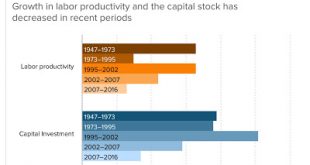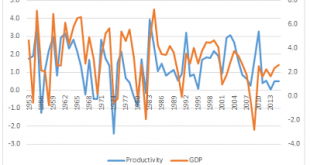I have written on deindustrialization before (see here and here), and commented on the CHIPS Act, and how it was one of the first, if not the first, re-shoring of manufacturing jobs into the US. Krugman just wrote a column on that, noting that the concern with manufacturing is now bipartisan, as Biden policies follow Trump's, he argues the former more successfully than the latter. Also, I should note that the the pressures for US corporations to reorganize their supply chains away from China...
Read More »Technological progress is NOT the cause of unemployment and inequality
Or that is what the recent Economic Policy Institute (EPI) Report by Lawrence Mishel and Josh Bivens says. Their study is essentially a critique of a recent study by Acemoglu and a co-author that suggests that robotization would have a large effect on employment generation. Note that this is not a requirement in mainstream neoclassical (marginalist) theory. Actually, technological progress should generate higher real wages and higher employment in the conventional model of the labor market...
Read More »Economic Regularities and “Laws” and the Riksbank Prize too
I've been reading The Nobel Factor: The Prize in Economics, Social Democracy, and the Market Turn by Avner Offer, Gabriel Söderberg, an interesting critique of the use of the Nobel Prize to undermine the Welfare State, essentially by conservative groups in Sweden, that were influential within the Central Bank (Riksbank), that disliked the Social Democratic policies in place in the 1960s. I have been critical of the Riksbank prize before (see, for example, here or here; check also Lars...
Read More »On the AS/AD model and the micro/macro relation
I promised to discuss Nick Rowe's claim that one must start with Aggregate Demand and Supply (AS/AD) to explain macroeconomics. Nick's argument is that the AS/AD model is useful to analyze monetary economies, and he quite correctly points out that money must be part of the discussion from the start. In his words: And if you don't start with money, monetary exchange, and AD and AS, you are doing macro wrong. Because the only thing that makes macro different from micro general equilibrium...
Read More »Can Trumponomics work?
Work for whom? That's what Martin Sandbu (subscription required) asks in the Financial Times. In his view, it might. He cites Ken Rogoff -- of spreadsheet fame -- who also has said that it's a possibility. Sandbu cites Summers doubts on Trumponomics, which are all based on supply side factors, but has very little to say about that.* Like Rogoff, Sandbu thinks that what matters is private investment that matters, meaning demand, and, as it must be in these cases, the confidence fairy...
Read More »Cassidy on the productivity puzzle
John Cassidy is one of the best economic journalists around (together with Jeff Madrick probably). And not only because he has written about one of my mentors, Wynne Godley. In his last column he tackles the issue of productivity. And again I should say he is on the right track. He first gives a simple example of technological change from the donkey to the truck delivery system. Almost imperceptibly he tells you that you would change from one to another technology if: "you can find enough...
Read More »Crazy as Adam Smith: the Media Discovers the Kaldor-Verdoorn Effect
So Kevin Drum at Mother Jones discovers the Kaldor-Verdoorn effect, and the fact that growing demand might be the main cause of rising productivity, and idea as old as Adam Smith in his vent for surplus model (chapter 3 of the Wealth of Nations says that the division of labor, that is, productivity, which is the basis for development, is limited by the extent of the market, that is, by demand). I posted extensively on that here (all post by date here), and produced, as far as I know, the...
Read More » Heterodox
Heterodox

-310x165.png)


